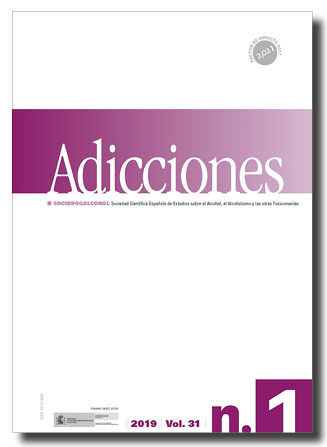Deterioro cognitivo y dependencia alcohólica, implicaciones clínicas
DOI:
https://doi.org/10.20882/adicciones.1284Palabras clave:
Deterioro cognitivo, alcohol, editorial.Resumen
Editorial del vol. 31-1Citas
Aharonovich, E., Campbell, A. N. C., Shulman, M., Hu, M. C., Kyle, T., Winhusen, T. y Nunes, E. V. (2018). Neurocognitive Profiling of Adult Treatment Seekers Enrolled in a Clinical Trial of a Web-delivered Intervention for Substance Use Disorders. Journal of Addiction Medicine, 12, 99-106. doi:10.1097/adm.0000000000000372.
Bates, M. E., Bowden, S. C. y Barry, D. (2002). Neurocognitive impairment associated with alcohol use disorders: implications for treatment. Experimental and Clinical Psychopharmacology, 10, 193-212.
Bates, M. E., Buckman, J. F. y Nguyen, T. T. (2013). A role for cognitive rehabilitation in increasing the effectiveness of treatment for alcohol use disorders. Neuropsychology Review, 23, 27-47. doi:10.1007/s11065-013-9228-3.
Erdozain, A. M., Morentin, B., Bedford, L., King, E., Tooth, D., Brewer, C., . . . Carter, W. G. (2014). Alcohol-related brain damage in humans. PloS One, 9, e93586. doi:10.1371/journal.pone.0093586.
Frias-Torres, C., Moreno-Espana, J., Ortega, L., Barrio, P., Gual, A. y Teixidor Lopez, L. (2018). Remediation therapy in patients with alcohol use disorders and neurocognitive disorders: A Pilot Study. Adicciones, 30, 93-100. doi:10.20882/adicciones.757.
Golpe, S., Isorna, M., Barreiro, C., Brana, T. y Rial, A. (2017). Binge drinking among adolescents: prevalence, risk practices and related variables. Adicciones, 29, 256-267. doi:10.20882/adicciones.932.
Hagen, E., Erga, A. H., Hagen, K. P., Nesvag, S. M., McKay, J. R., Lundervold, A. J. y Walderhaug, E. (2016). Assessment of Executive Function in Patients With Substance Use Disorder: A Comparison of Inventory- and Performance-Based Assessment. Journal of Substance Abuse Treatment, 66, 1-8. doi:10.1016/j.jsat.2016.02.010.
Hayes, V., Demirkol, A., Ridley, N., Withall, A. y Draper, B. (2016). Alcohol-related cognitive impairment: current trends and future perspectives. Neurodegenerative Disease Management, 6, 509-523. doi:10.2217/nmt-2016-0030.
Horton, L., Duffy, T., Hollins Martin, C. y Martin, C. R. (2015). Comprehensive assessment of alcohol-related brain damage (ARBD): gap or chasm in the evidence? Journal of Psychiatric and Mental Health Nursing, 22, 3-14. doi:10.1111/jpm.12156.
Maharasingam, M., Macniven, J. A. y Mason, O. J. (2013). Executive functioning in chronic alcoholism and Korsakoff syndrome. Journal of Clinical and Experimental Neuropsychology, 35, 501-508. doi:10.1080/13803395.2013.795527.
Moretti, R., Caruso, P., Dal Ben, M., Gazzin, S. y Tiribelli, C. (2017). Thiamine and Alcohol for Brain Pathology: Super-imposing or Different Causative Factors for Brain Damage? Current Drug Abuse Reviews, 10, 44-51. doi:10.2174/1874473711666180402142012.
Naim-Feil, J., Fitzgerald, P. B., Bradshaw, J. L., Lubman, D. I. y Sheppard, D. (2014). Neurocognitive deficits, craving, and abstinence among alcohol-dependent individuals following detoxification. Archives of Clinical Neuropsychology, 29, 26-37. doi:10.1093/arclin/act090.
Ridley, N. J., Draper, B. y Withall, A. (2013). Alcohol-related dementia: an update of the evidence. Alzheimer’s Research and Therapy, 5, 3. doi:10.1186/alzrt157.
Sachdeva, A., Chandra, M., Choudhary, M., Dayal, P. y Anand, K. S. (2016). Alcohol-Related Dementia and Neurocognitive Impairment: A Review Study. International Journal of High Risk Behaviors and Addiction, 5, e27976. doi:10.5812/ijhrba.27976.
Stavro, K., Pelletier, J. y Potvin, S. (2013). Widespread and sustained cognitive deficits in alcoholism: a meta-analysis. Addiction Biology, 18, 203-213. doi:10.1111/j.1369-1600.2011.00418.x.
Svanberg, J. y Evans, J. J. (2013). Neuropsychological rehabilitation in alcohol-related brain damage: a systematic review. Alcohol and Alcoholism, 48, 704-711. doi:10.1093/alcalc/agt131.
Vargas-Martinez, A. M., Trapero-Bertran, M., Gil-Garcia, E. y Lima-Serrano, M. (2018). Impact of the Binge Drinking (BD) in Adolescence. Are we doing it right? Adicciones, 30, 152-154. doi:10.20882/adicciones.1033.
Wilcox, C. E., Dekonenko, C. J., Mayer, A. R., Bogenschutz, M. P. y Turner, J. A. (2014). Cognitive control in alcohol use disorder: deficits and clinical relevance. Reviews in the Neurosciences, 25, 1-24. doi:10.1515/revneuro-2013-0054.
Wollenweber, F. A., Halfter, S., Brugmann, E., Weinberg, C., Cieslik, E. C., Muller, V. I., . . . Eickhoff, S. B. (2014). Subtle cognitive deficits in severe alcohol addicts--do they show a specific profile? Journal of Neuropsychology, 8, 147-153. doi:10.1111/jnp.12001.
Woods, A. J., Porges, E. C., Bryant, V. E., Seider, T., Gongvatana, A., Kahler, C. W., . . . Cohen, R. A. (2016). Current Heavy Alcohol Consumption is Associated with Greater Cognitive Impairment in Older Adults. Alcoholism, Clinical and Experimental Research, 40, 2435-2444. doi:10.1111/acer.13211.
Zahr, N. M. y Pfefferbaum, A. (2017). Alcohol’s Effects on the Brain: Neuroimaging Results in Humans and Animal Models. Alcohol Research: Current Reviews, 38, 183-206.








